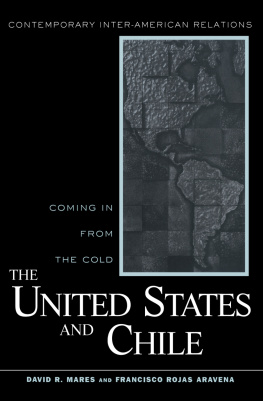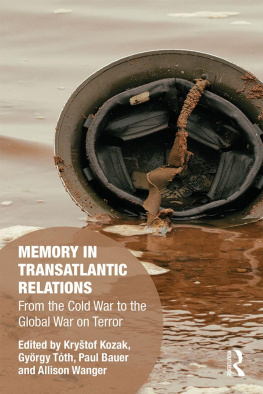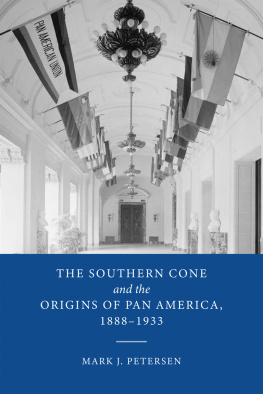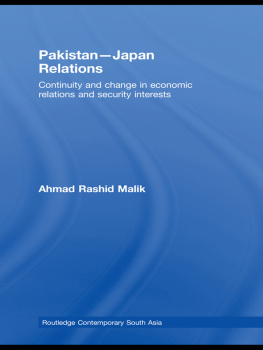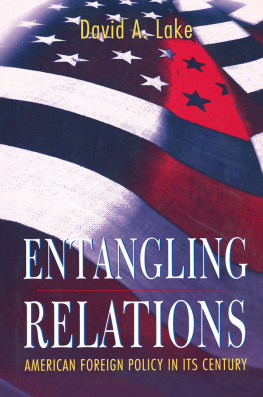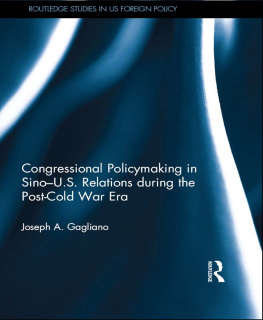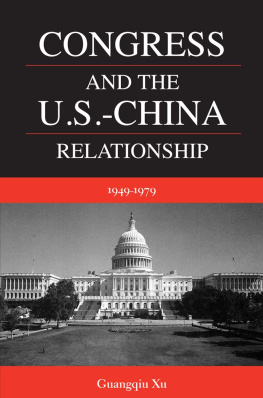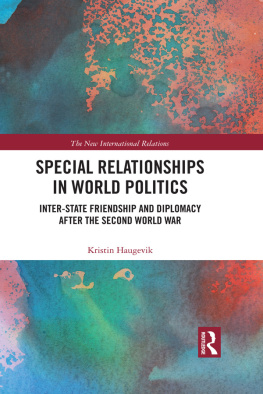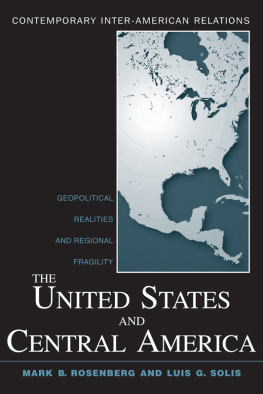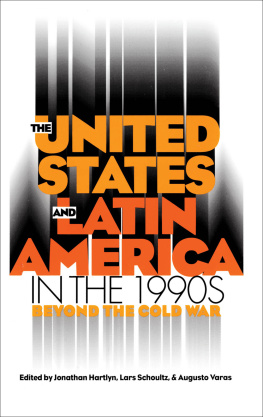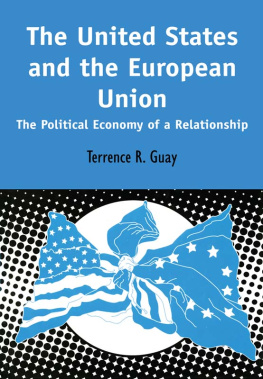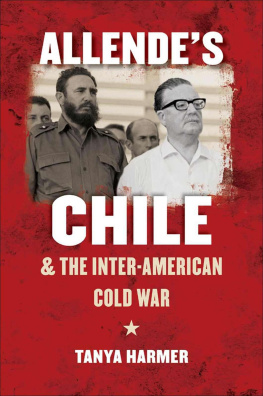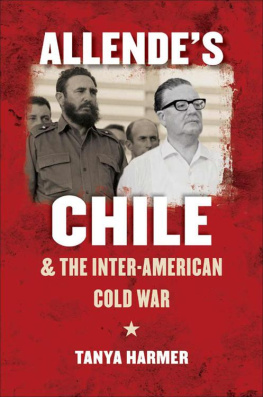THE U NITED S TATES AND C HILE
OTHER TITLES IN THE CONTEMPORARY INTER-AMERICAN RELATIONS SERIES
EDITED BY JORGE DOMNGUEZ AND RAFAEL FERNNDEZ DE CASTRO
The United States and Mexico:
Between Partnership and Conflict
JORGE DOMNGUEZ AND RAFAEL FERNNDEZ DE CASTRO
The United States and Chile:
Coming in from the Cold
DAVID R. MARES AND FRANCISCO ROJAS ARAVENA
The United States and Venezuela:
Rethinking a Relationship
JANET KELLY AND CARLOS A. ROMERO
The United States and Argentina:
Changing Relations in a Changing World
DEBORAH NORDEN AND ROBERTO RUSSELL
Published in 2001 by
Routledge
711 Third Avenue,
New York, NY 10017
Published in Great Britain by
Routledge
2 Park Square, Milton Park,
Abingdon, Oxon, OX14 4RN
Routledge is an imprint of the Taylor & Francis Group.
Transferred to digital printing 2011
Copyright 2001 by Routledge
All rights reserved. No part of this book may be reprinted or reproduced or utilized in any form or by any electronic, mechanical, or other means, now known or hereafter invented, including photocopying and recording, or in any information storage or retrieval system, without permission in writing from the publishers.
Library of Congress Cataloging-in-Publication Data
Mares, David R.
The Unted States and Chile: coming in from the cold / David R. Mares and Francisco Rojas
Aravena.
p. cm. (Contemporary inter-American relations)
Includes bibliographical references and index.
ISBN 0-415-93124-X (hb) ISBN 0-415-93125-8 (pb)
1. United StatesForeign relationsChile. 2. ChileForeign relationsUnited States.
I. Rojas Aravena, Francisco. II. Title. III. Series.
JZ1480.A57 C5 2001
327.73083dc21
2001016596
Publishers Note
The publisher has gone to great lengths to ensure the quality of this reprint but points out that some imperfections in the original may be apparent.
The transition from authoritarian rule to constitutional government.
The continentwide economic depression of the 1980s and the subsequent shift toward more open market-conforming economies.
The end of the Cold War in Europe.
The transformation of relations with the United States.
EACH OF THESE MAJOR EVENTS AND PROCESSES WAS AN
epochal change in the history of Latin America and the Caribbean. More striking is that all four changes took place within the same relatively short period, though not all four affected each and every country in the same way. They became interconnected, with change in each dimension fostering convergent changes in other dimensions. Thus at the beginning of the new millennium we witnessed an important transformation and intensification in U.S.Latin American relations.
This book is part of a series of ten books on U.S. relations with Latin American and Caribbean countries. Each of these books is focused on the fourth of these four transformations, namely, the change in U.S. relations with Latin America and the Caribbean. Our premise is that the first three transformations provide pieces of the explanation for the change in U.S. relations with its neighbors in the Americas and for the changes in the foreign policies of Latin American and Caribbean states. Each of the books in the series assesses the impact of the epoch-making changes upon each other.
The process of widest impact was the economic transformation. By the end of 1982, much of North America, western Europe, and East Asia was launching into an economic boom at the very instant when Latin America was plunging into an economic depression of great severity that lasted approximately to the end of the decade. As a consequence of such economic collapse, nearly all Latin American governments readjusted their economic strategies. They departed from principal reliance on import-substitution industrialization, opened their economies to international trade and investment, and adopted policies to create more open market-conforming economies. (Even Cuba had changed its economic strategy by the 1990s, making its economy more open to foreign direct investment and trade.)
The regionwide economic changes had direct and immediate impact upon U.S.Latin American relations. The share of U.S. trade accounted for by Latin America and the Caribbean had declined fairly steadily from the end of World War II to the end of the 1980s. In the 1990s, in contrast, U.S. trade with Latin America grew at a rate significantly faster than the growth of U.S. trade worldwide; Latin America had become the fastest-growing market for U.S. exports. The United States, at long last, took notice of Latin America. Trade between some Latin American countries also boomed, especially within subregions such as the southern cone of South America, Venezuela and Colombia, the Central American countries, and, to a lesser extent, the Anglophone Caribbean countries. The establishment of formal freer-trade areas facilitated the growth of trade and other economic relations. These included the North American Free Trade Agreement (NAFTA), which grouped Mexico, the United States, and Canada; the Mercosur (southern common market), with Argentina, Brazil, Paraguay, and Uruguay; the Andean Community, whose members were Bolivia, Colombia, Ecuador, Peru, and Venezuela; the Central American Common Market (CACM); and the Caribbean Community (CARICOM). U.S. foreign direct and portfolio investments flowed into Latin America and the Caribbean in large quantities, financing the expansion of tradable economic activities; the speed of portfolio investment transactions, however, also exposed these and other countries to marked financial volatility and recurrent financial panics. The transformation in hemispheric international economic relationsand specifically in U.S. economic relations with the rest of the hemispherewas already far-reaching as the twenty-first century began.
These structural economic changes had specific and common impacts on the conduct of international economic diplomacy. All governments in the Americas, large and small, had to develop a cadre of experts who could negotiate concrete technical trade, investment, and other economic issues with the United States and with other countries in the region. All had to create teams of international trade lawyers and experts capable of defending national interests and the interests of particular business firms in international, inter-American, or subregional dispute-resolution panels or courtlike proceedings. The discourse and practice of inter-American relations, broadly understood, became much more professionalless the province of eloquent poets, more the domain of number-crunching litigators and mediators.
The changes in Latin Americas domestic political regimes began in the late 1970s. These, too, would contribute to change the texture of inter-American relations. By the end of 1990, democratization based on fair elections, competitive parties, constitutionalism, and respect for the rule of law and the liberties of citizens had advanced and was still advancing throughout the region, albeit unevenly and with persisting serious problems, Cuba being the principal exception.

